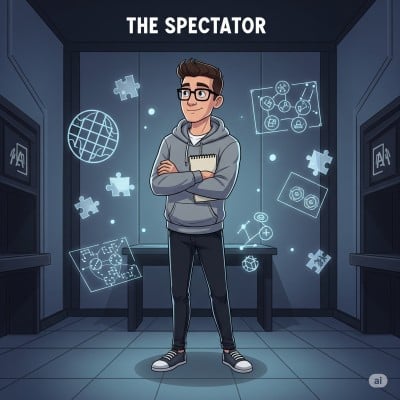In the high-energy environment of an escape room, the loudest voices and the quickest hands often steal the spotlight. The Strategist calls out plans, the Searcher rummages through hidden spaces, and the Lock Keeper triumphantly clicks open the final combination. But in the background, another role quietly shapes the team’s success the Spectator ⚡ 🔒.
At first glance, the Spectator might seem passive, even disengaged. They aren’t scrambling to solve riddles or tearing apart cushions in search of a hidden key. But their contribution is far from passive it is one of patience, clarity, and observation. By stepping back from the chaos, the Spectator notices things that others 🌌 👤, caught in the frenzy of activity, often overlook.
The Spectator’s strength lies in their perspective. While other players may be narrowly focused on a single puzzle or locked into a specific task, the Spectator keeps an eye on the room as a whole. They spot patterns across puzzles, observe team dynamics, and often catch overlooked details that prove essential to success 🧐 💡. A missed symbol on the wall, a discarded clue in the corner, or even a teammate struggling silently all of these may come to the Spectator’s attention before anyone else realizes what’s happening 🙈 ❗.
In this sense, the Spectator functions as the team’s silent safeguard. Escape rooms are designed to create urgency and pressure 🏆 ✅, which can easily cause players to miss obvious connections or make mistakes. Their contribution might come less frequently than others, but when it does, it can be the turning point between failure and escape 🎯 👓.
The Spectator also provides an important balance to team dynamics. In many rooms, certain players dominate through volume, enthusiasm, or authority ⏳ 🔥. While these traits can be useful, they sometimes drown out quieter voices or lead to tunnel vision. The Spectator, with their reflective style, ensures that the team doesn’t spiral into one-track thinking 🚪 🔒. They might interject with a gentle reminder “Did we ever use that number code we found earlier. Their ability to intervene calmly often resets the group’s focus and restores harmony 🏃♀ ️ 🎉.
Escape rooms thrive on communication, but in the chaos, information is often repeated, misheard, or forgotten ⚖ ️ 🌿. The Spectator’s attentive presence allows them to piece together threads of conversation and recall details others have let slip. They may not speak often, but when they do, it’s usually to remind the team of something vital something that everyone else was too busy to remember 🤲 🌊.
You don’t need to force yourself into a louder or more hands-on role to contribute meaningfully. Instead, lean into your strengths: observation, patience, and timing 🧵 🗨 ️. Learn to trust your instincts about when to speak up, and embrace the fact that your quieter approach offers something no other role provides 💎 🌟.














